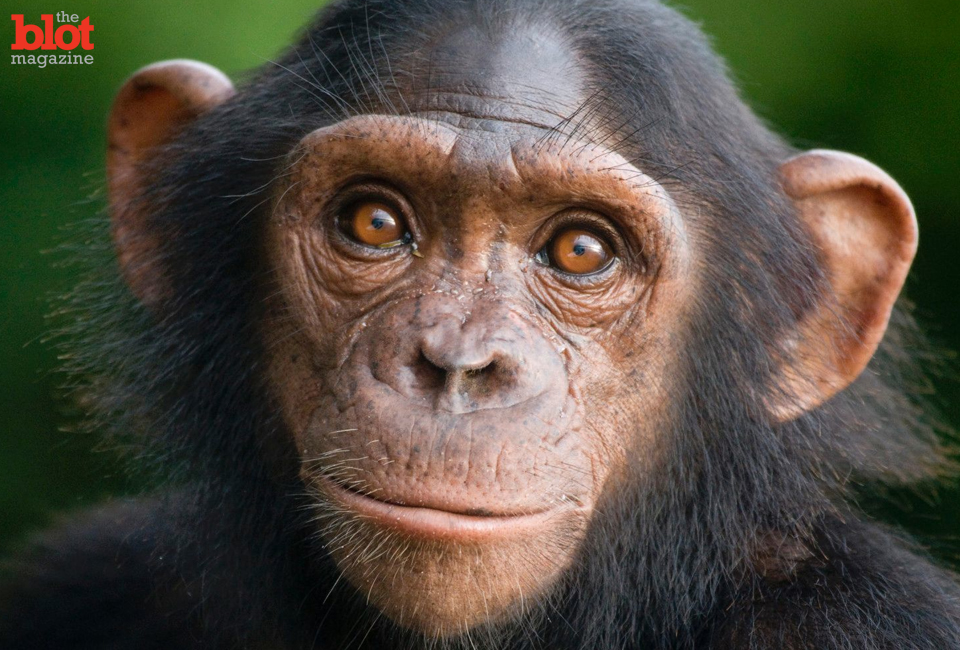
Tommy lives behind Circle L Trailer Sales, which is on Route 30 by Gloversville, N.Y. Santa’s Hitching Post operates out of the same location renting out reindeer around the holidays. He spends a lot of his time watching cartoons. He is 26-years-old. Sounds like the kind of guy you don’t want your kid dating, a major slacker/loser type. Moreover, he’s involved in a legal case — great, a slacker in trouble with the law.
But Tommy is a little different than that because, you see, Tommy is a chimpanzee, and the court case is over whether he is legally a person. I realize this may sound preposterous, but then, a lot of the legal system is (judges in robes, and where are you gonna find 12 people I consider my peers?). In fact, I happen to back those people who are arguing that Tommy should be recognized as a legal person.
The Nonhuman Rights Project (NhRP) is arguing in a 79-page brief that Tommy’s being kept in a “small, dank, cement cage in a cavernous dark shed.” Yet, this isn’t a case about animal cruelty. The living conditions are just a way to get into court. NhRp says chimps exhibit “complex cognitive abilities as autonomy, self-determination, self-consciousness, awareness of the past, anticipation of the future and the ability to make choices; display complex emotions such as empathy; and construct diverse cultures.”
“We are talking about bringing these lawsuits on behalf of nonhuman animals because there is a lot of scientific evidence that they, too, are autonomous,” said Tommy’s self-appointed lawyer, Steven M. Wise, author of “Rattling the Cage: Toward Legal Rights for Animals.” “We think there is sufficient evidence for all four groups of apes as well as elephants, whales and dolphins,” he said. “We are going to be busy for a long time.”
If Wise wins, he wants Tommy transferred to the 120-acre North American Primate Sanctuary Alliance in Wauchula, Fla., where 45 great apes, mostly former research animals, live. The sharp-eyed reader will wonder whether the lawyer’s wish doesn’t undermine the case? After all, if Tommy is a legal person, where does his lawyer get off deciding where he lives? Isn’t that up to Tommy?
Well, not exactly. Wise likens Tommy to a 4- or 5-year-old human; having raised three humans myself, that might be a bit unkind to Tommy. However, the point is “They have the capacity for rights,” he said. “But you can’t sue them criminally or prosecute them civilly. They are autonomous enough to have fundamental rights but not mature enough to have criminal or civil liability.”
A great many legal minds oppose this view. Indeed, Richard Epstein, a New York University law professor, has debated Wise on this very subject. He and others adopt a slippery slope argument.
“If you go the whole nine yards you face two major questions: Which animals do it? Chimps and bonobos are obvious, but what about other apes that are small and not friendly?” said Epstein at the debate. “Or cattle or domesticated sheep or squirrels or rats. How far do we want to run with this?
“We can find emotions in rats — they have endorphins, too. The number of genes in fruit flies and human beings are the same — 60 percent.” If I have my facts straight, humans and bananas share 40 percent.
Besides, if chimps and bonobos (formerly known as the pygmy chimpanzee) are obvious, then let’s do it and worry about the rats later. Moreover, I seem to recall from my history classes that black Americans once were considered only 3/5 of a person and could be sold like any other asset.
Epstein argued in the debate that the definition of personhood is “someone who is part of the same species — who could interbreed.” This raises the ugly idea of corporations having legal person status. Now, I know for a fact that most of us at one point or another have been screwed by a corporation, but that doesn’t really count as interbreeding in my books. Nor does any legal code with which I am aware say that is the definition of personhood.
However, there is a precedent of sorts for non-human personhood. In 2008, Spain’s Cortes Generales legislature adopted a resolution supporting the Great Ape Project. The GAP states that the rights to life, liberty and freedom from physical and psychological torture should be guaranteed to chimps, bonobos, gorillas and orangutans.
As I see it, there isn’t a great divide between Homo sapiens and the rest of nature. It’s all a great big spectrum of sentience. Amoebae are at one end, and we are at the other. Some species, like Tommy’s, are close enough that our own humanity demands that we treat them with the same care and consideration we would our own.
That doesn’t mean I am giving up steak. Yes, I am a hypocrite. Nothing could be more human. Indeed, that might be part of the 2 percent I don’t share with Tommy.
Jeff Myhre is a contributing journalist for TheBlot Magazine.





